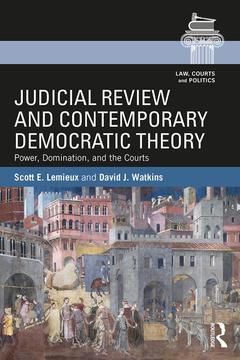Judicial Review and Contemporary Democratic Theory Power, Domination, and the Courts Law, Courts and Politics Series
Auteurs : Lemieux Scott E., Watkins David J.

For decades, the question of judicial review?s status in a democratic political system has been adjudicated through the framework of what Alexander Bickel labeled "the counter-majoritarian difficulty." That is, the idea that judicial review is particularly problematic for democracy because it opposes the will of the majority.
Judicial Review and Contemporary Democratic Theory begins with an assessment of the empirical and theoretical flaws of this framework, and an account of the ways in which this framework has hindered meaningful investigation into judicial review?s value within a democratic political system. To replace the counter-majoritarian difficulty framework, Scott E. Lemieux and David J. Watkins draw on recent work in democratic theory emphasizing democracy?s opposition to domination and analyses of constitutional court cases in the United States, Canada, and elsewhere to examine judicial review in its institutional and political context.
Developing democratic criteria for veto points in a democratic system and comparing them to each other against these criteria, Lemieux and Watkins yield fresh insights into judicial review?s democratic value. This book is essential reading for students of law and courts, judicial politics, legal theory and constitutional law.
Introduction Part 1 1. Beyond the Countermajoritarian Difficulty 2. How Not to Argue About Judicial Review and Democracy 3. The Revolution will be Sub Silentio: The Roberts Court and Judicial Minimalism Part 2 4. Democracy-Against-Domination and Contemporary Democratic Theory 5. Compared to What? Judicial Review as Just Another Veto Point 6. Judicial Review in a Comparative Context 7. Conclusion: Toward a Realist, Institutionalist Democratic Theory
Scott E. Lemieux is a Lecturer in Political Science at the University of Washington. His research interests include the relationship between the courts and other political branches, the impact of (and backlash against) judicial rulings, and the democratic legitimacy of judicial review. He has written or co-written articles in journals including Perspectives on Politics, Polity, Studies In Law, Politics and Society, New Political Science, the Maryland Law Review, the Journal of Supreme Court History, and the American Journal of Comparative Law. He is also a co-founder of the blog Lawyers, Guns & Money and contributes regularly to publications including The New Republic, The Week, the Guardian, the Los Angeles Times, and the American Prospect.
David J. Watkins is Associate Professor of Political Science at the University of Dayton, where he teaches historical and contemporary political theory courses, as well as courses on democracy and democratization. His research focuses on contemporary political theory, with particular attention to neorepublican thought. Recently, his work has appeared in journals such as Perspectives on Politics, Political Theory, and Polity.
Date de parution : 11-2017
15.2x22.9 cm
Date de parution : 11-2017
15.2x22.9 cm
Thèmes de Judicial Review and Contemporary Democratic Theory :
Mots-clés :
Countermajoritarian Difficulty; Law and Courts; Contemporary Democratic Theory; Constitutional Law; Good Life; Legal Theory; Agonistic Democratic Theory; Judicial Review; Democracy; Reliable Path; Democratic Theory; Veto Point; Political Institutions; 8th Amendment’s Prohibition; Veto Points; Constitutional Judicial Review; Executive and Administrative Action; Alexander Bickel; Judicial Minimalism; Counter-Majoritarian Difficulty (CMD); Deliberative Democratic Theorists; Supreme Court; Deliberative Democracy; Jeremy Waldron; Trimester Framework; Mark Graber; Veto Players; Howard Gillman; Violate; Cornell Clayton; Roberts Court; Barry Friedman; Liberum Veto; Terri Peretti; Rehnquist Court; Agonistic Democratic; Cass Sunstein; Minimalist Judges; David J; Watkins; Judicial Modesty; Abortion Regulations; Non-public Reasons; Public Reason



